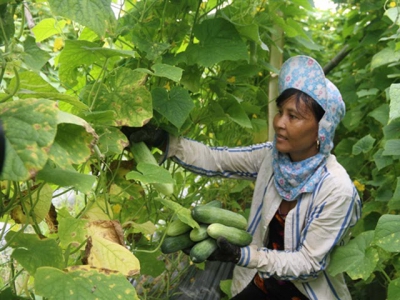Trà Vinh promotes agricultural restructuring as drought, saline intrusion damages crops

TRÀ VINH — Authorities in the Cửu Long (Mekong) Delta province of Trà Vinh have encouraged farmers to restructure their crop cultivation to mitigate the impact of drought and saltwater intrusion.
Harvesting cucumbers in Trà Vinh Province’s Trà Cú District. — VNA/VNS Photo Thanh Hòa
The coastal province has been seriously affected by climate change in recent years, especially saltwater intrusion from the sea through river mouths during the dry season.
In the ongoing 2019- 20 dry season, saltwater intrusion has occurred earlier than usual and affected nearly 15,000ha of the province’s 60,000ha of the winter-spring rice.
In Trà Cú District, which is the hardest hit by saltwater intrusion, about 55 per cent of the winter-spring rice has been affected by saltwater intrusion.
Huỳnh Văn Thảo, head of the Trà Cú Bureau of Agriculture and Rural Development, said the district is assisting farmers to protect their winter-spring rice and restructure rice cultivation for the next crops.
“Farmers have been encouraged to grow only early winter-spring rice and late autumn-winter rice next year,” he said.
In the 2020 – 21 winter-spring rice, Trà Cú is encouraging farmers to grow only 5,000ha of rice, down by 50 per cent of against the 2019 -20 winter-spring rice. The reduced areas will be used for other drought resistant crops like peanut, chilli and taro.
In Cầu Kè District, authorities have called on farmers to turn ineffective rice fields to other high value crops like king orange, gấc fruit (Momordica cochinchinensis), and sáp coconut (a specialty coconut variety that has soft and thick pulp).
Phạm Văn Kha, deputy head of the Cầu Kè Bureau of Agriculture and Rural Development, said the district had encouraged farmers to participate in co-operatives so they can produce on a large scale and access advanced farming techniques.
Farmers should use safe and organic standards, so they can link with companies to guarantee outlets and improve income, he said.
Rice farmers who switched to other crops in drought and saltwater affected areas in recent years have 1.5 – 4 times higher profits than from rice, according to the province’s Department of Agriculture and Rural Development.
Phạm Minh Truyền, director of the department, said the province planned to grow only 51,000ha of rice in the 2020 – 21 winter-spring crop, down 17,000ha against the 2019- 20 winter-spring crops.
The 17,000ha would be switched to other crops, he said.
The department in co-operation with localities was building plans for restructuring crops suited to each area, he said.
The province plans to grow three rice crops a year in areas which can secure irrigation water. In areas affected by drought and saltwater intrusion, farmers are encouraged to grow only two rice crops and one other crop a year.
The province is also researching market demand and seeking outlets for farmers so they can restructure their crop cultivation properly.
Farmers have turned about 19,000ha of ineffective rice fields to other crops under the province’s agricultural restructuring plan launched in 2014.
The province has many key agricultural products, including rice, vegetables, peanut, coconut and shrimp.
Agricultural extension
Trà Vinh has carried out many agricultural extension activities to improve income for farmers in recent years.
Last year, the province’s Department of Agriculture and Rural Development organised 326 courses on techniques for growing crops, breeding animals and aquatic species for nearly 10,000 farmers.
The department gave instruction in effective farming models for 700 farmers last year.
In the 2020 - 22 period, the province plans to spend more than VNĐ10 billion (US$423,000) for agricultural extension activities.
The activities include providing farmers with advanced techniques to grow vegetables in net houses with automatic irrigation systems, and grow clean fruits and organic coconuts; breed chicken by using medicinal plants in their food to reduce the use of antibiotics, breed female pigs for reproducing piglets, and oxen for meat; and breed shrimp under intensive farming methods.
Truyền, director of the department, said the research, transfer and application of advanced techniques aimed to improve yield and quality of agricultural products.
It also ensured food safety, reduced production costs and increased competitiveness and effectiveness of the province’s agricultural restructuring, he said.
Related news
 Rice cultivation must ensure domestic supply in spite of difficulties: agricultural ministr
Rice cultivation must ensure domestic supply in spite of difficulties: agricultural ministr In spite of challenges brought by saline intrusion and COVID-19, rice cultivation in the Mekong Delta localities must ensure domestic supply
 Winter-spring rice production exceeds 10.7 million tons in Mekong Delta
Winter-spring rice production exceeds 10.7 million tons in Mekong Delta On March 27 held an online meeting to summarize preliminarily the winter-spring rice crop, deploy the production plan for the summer-autumn, winter, and autumn
 Mekong Delta rice farmers earn high income from rice straw
Mekong Delta rice farmers earn high income from rice straw Rice farmers in the Cửu Long (Mekong) Delta are earning higher incomes from selling rice straw left over from the harvested 2019 – 20 winter-spring rice crop.